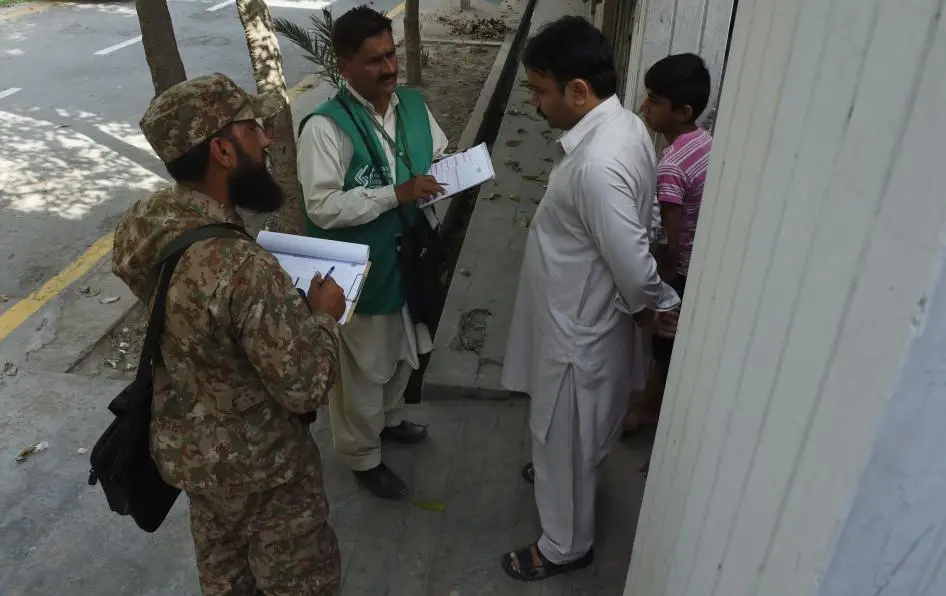This article is part of Dissent Today’s special series on Pakistan’s general elections. Follow the series here.
In theory, Pakistan is a federal parliamentary democracy, which elects its representatives through universal adult franchise. Joint electorates which were restored in 2002 mean that all citizens of Pakistan should be placed on the same electoral rolls regardless of their faith. This is true for almost all citizens, Muslims, Hindus, Christians, Sikhs etc., except one community which is placed on a separate list for no plausibly rational reason: the Ahmadi community.
Ahmadis are placed on a supplementary “non-Muslim” list and thus subject to state sponsored discrimination. In 2002, when the joint electorate was restored through an executive order, the then military regime, which otherwise portrayed itself as the bastion of enlightened moderation, placed Ahmadis on this separate list, telling Ahmadis that this was a minor concession to the Mullahs. It was not just a minor concession though because it hit at the root of the idea of citizenship in Pakistan, because from then on Ahmadis are the only other in citizenship category, given that none of the other communities, Muslim or non-Muslim, are placed on a separate list.
Declared non-Muslim for the purposes of law and constitution through a constitutional amendment in 1974, Ahmadis have faced systematic denial of their fundamental rights guaranteed to them under the constitution as citizens, including their right to cast their votes in a general election.
Ahmadis believe that they are Muslims and Article 20 of the Constitution does allow them the right to believe they are, even if the state considers them non-Muslim for the purposes of law and constitution. Since they believe they are Muslims and have the same names as official Muslims, they somehow are deemed to pose a threat to the faith of the majority by merely being on the same list. Hence, they alone must be placed on this supplementary non-Muslim list. In other words, they can vote only if they accept that they are non-Muslim. To reiterate, Christians, Hindus, Sikhs etc. are placed on the main rolls with Muslims.
Consequently, the Ahmadis have once again decided to boycott the elections this year citing this unconscionable discrimination which, they say in a press release issued by the Anjuman-e-Ahmadiyya, militates against not just the constitutional scheme which speaks of equality but the solemn promises of equality of citizenship that Quaid-e-Azam Mohammad Ali Jinnah made to all citizens of Pakistan, Muslim or non-Muslim.
Joint electorates which were restored in 2002 mean that all citizens of Pakistan should be placed on the same electoral rolls regardless of their faith. But Ahmadis are placed on a supplementary “non-Muslim” list and thus subject to state-sponsored discrimination.
Supporters of the separate list for Ahmadis and the ensuing discriminatory practices contend that since Ahmadis do not acknowledge their classification as non-Muslims according to the constitution, they should be deemed ineligible for the fundamental rights enshrined in that very constitution. This is a very dangerous argument to make and is patently wrong. Disagreeing with constitutional provisions is neither illegal nor unconstitutional. This is why there is a process to introduce a constitutional amendment. Every time you amend the Constitution, you are actually disagreeing with some part of it. It is therefore perfectly constitutional to disagree with the 2nd Amendment. It is perfectly constitutional to espouse the idea that one day Pakistanis will have the collective wisdom to undo it. The Constitution of Pakistan does not require an Ahmadi to accept that he or she is a non-Muslim. It states that for the purposes of the Law and Constitution, Ahmadis are non-Muslim, which means that an Ahmadi cannot hold the office of the President or Prime Minister.
The right of an Ahmadi to reject the second amendment, however, is protected by Article 20 as well as the Objectives Resolution. The notion that Ahmadis will be granted their rights as citizens only if they concede their non-Muslim status, is an untenable proposition. Conversely, even if Ahmadis were to acquiesce to this demand, some might subsequently insist on labeling them as Murtad or apostates. Ultimately, this amounts to calling forth a flood. Ahmadis’ resistance to their pigeonholing into the non-Muslim category is actually a very needed push back to the idea that the state can decide who is a Muslim and who is not.
This question aside, the denial of franchise on the basis of a theological question is out of step with the idea of a nation state in 21st century. While there are states that confine citizenship to one group or the other or make citizenship rights contingent on religious or ethnic considerations, those states are no models to emulate. As the Supreme Court of Pakistan held in the Tahir Naqqash case in 2022, the Pakistani constitution does not disavow Ahmadis as citizens and therefore the state is bound to accord to them equal rights regardless of their status as Muslims or Non-Muslims. The Constitution of 1973 states in 106(2):
“A person shall be entitled to vote if-
(a) he is a citizen of Pakistan;
(b) he is not less than eighteen years of age;
(c) his name appears on the electoral roll; and
(d) he is not declared by a competent court to be of unsound mind.”
Furthermore, Pakistan is bound by its international covenants to accord this right. Article 21 of the Universal Declaration on Human Rights states:
“Everyone has the right to take part in the government of his country, directly or through freely chosen representatives.”
Article 25 of the International Covenant on Civil and Political Rights (ICCPR) that Pakistan ratified in 2010 states:
“Every citizen shall have the right and the opportunity, without any of the distinctions mentioned in article 2 and without unreasonable restrictions:
(a) To take part in the conduct of public affairs, directly or through freely chosen
representatives;
(b) To vote and to be elected at genuine periodic elections which shall be by
universal and equal suffrage and shall be held by secret ballot, guaranteeing the
free expression of the will of the electors”
The question of faith therefore cannot arise when determining electoral rolls. Every citizen ought to be on the same roll without exception. As things stand, Ahmadis are excluded from this basic exercise of citizenship and this violates Pakistan’s international obligations. Technically this would be enough to strip Pakistan of its GSP+ status and other preferential trade deals that have been linked to the country’s fulfillment of these obligations. The problem is easily fixable (put everyone on the same list) but the state seems utterly powerless against extremists that drive this popular discrimination.

The writer is an advocate of the high courts of Pakistan and author of ‘Jinnah: A Life.’

